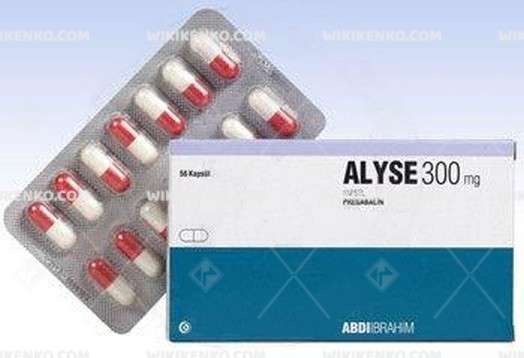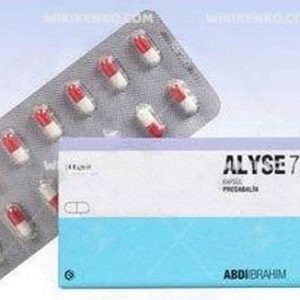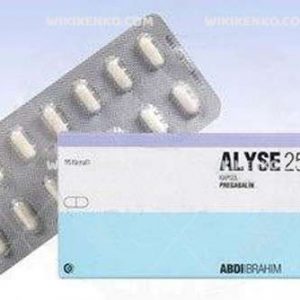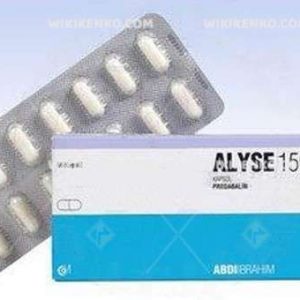Alyse Capsule 300 Mg
When it comes to pharmaceuticals, understanding your prescribed medication is crucial. Alyse, a drug containing 300 mg of the active ingredient pregabalin, comes in blister packs offering 28 or 56 capsules. These capsules are easily recognizable with their red and white color scheme, featuring a white body and a red cap.
| Dosage form | |
|---|---|
| Pack size | |
| Potency | 300Mg |
| Manufacturer | |
| Origin | |
| Generic Name (Ingredient) | Pregabalin 300 Mg |
Assuming your emergency circumstances for this product, visit Urgent Quotation page. Besides, for any pharmaceutical questions, please ask us in the comments section.
Description
Applications
Alyse serves as a versatile solution for several medical conditions, including:
1. Partial Epilepsy Seizures
Alyse plays a crucial role as an adjunct treatment alongside other seizure medications, effectively managing partial epilepsy seizures.
2. Peripheral Neuropathic Pain
For individuals grappling with long-term pain stemming from peripheral nerve damage, often caused by diseases such as diabetes or shingles, Alyse provides much-needed relief.
3. Generalized Anxiety Disorder
Alyse emerges as a potent ally in managing generalized anxiety disorder, helping individuals regain control over excessive worry and anxiety.
4. Fibromyalgia
Within the realm of soft tissue rheumatism, Alyse proves to be a valuable treatment option. It effectively addresses the widespread pain primarily impacting muscles and their attachment points to bones.
Alyse is tailored for use by adults aged 18 years and older. It is important to note that its use is not recommended for individuals under the age of 18 due to the absence of sufficient safety and efficacy data.
Side Effects
Like all medications, Alyse can introduce side effects. Among the most frequently reported side effects of Alyse are dizziness, somnolence, dry mouth, edema, blurred vision, weight gain, and abnormal thinking. However, it’s crucial to remember that not everyone who takes it will experience these side effects. If you are concerned about the potential side effects, it is advisable to consult your doctor or pharmacist for more information. They can provide guidance on how to manage any side effects that may arise during your treatment.
Dosage
The optimal dosage of Alyse depends on the specific condition it is intended to treat. Let’s explore the recommended dosages for two prevalent applications:
Neuropathic Pain Associated with Diabetic Peripheral Neuropathy
For this condition, the maximum suggested Alyse dose is 100 mg three times a day (300 mg/day) in patients with a creatinine clearance of at least 60 mL/min. Treatment typically begins at 50 mg three times a day (150 mg/day) and may be escalated to 300 mg/day within one week, contingent on effectiveness and tolerance.
Epilepsy
Alyse treatment for epilepsy typically starts with a dose of 150 mg per day, divided into two or three administrations. Depending on individual patient response and tolerability, this dose may be increased to 300 mg per day after one week. Following an additional week, the dose may be further elevated to 450 mg per day.
It’s crucial to emphasize that the dosage should be individualized based on the patient’s response and tolerance. Consulting a healthcare provider before initiating or altering the dosage of any medication is always advisable.
Interaction with Alcohol
Alyse has the potential to induce excessive drowsiness when consumed alongside alcohol. It is generally prudent to either avoid or limit alcohol consumption when taking medications that can cause drowsiness. The combination can heighten the risk of side effects such as dizziness, impaired coordination, and impaired judgment. Should you have inquiries or concerns regarding the interaction between Alyse and alcohol, consulting your healthcare provider or pharmacist is recommended for tailored advice.
The Mechanism of Action of Alyse
Alyse contains the active ingredient pregabalin, which is thought to work by binding to a specific subunit of voltage-gated calcium channels in the brain and spinal cord. This binding disrupts calcium channel trafficking or reduces calcium currents, which in turn inhibits the release of several neurotransmitters. Studies also suggest that descending noradrenergic and serotonergic pathways originating from the brainstem may be involved in the mechanism of action of pregabalin.
Conclusion
In the realm of pharmaceuticals, comprehending your prescribed medication is essential. Alyse, armed with the active ingredient pregabalin, offers a versatile strategy to tackle various conditions. By acquainting yourself with potential side effects, determining appropriate dosages, and exercising caution with alcohol, you can effectively harness the benefits while managing your medical condition. Remember to consult your healthcare provider for personalized guidance on your journey to well-being.
Use the form below to report an error
Please answer the questions as thoroughly and accurately as possible. Your answers will help us better understand what kind of mistakes happen, why and where they happen, and in the end the purpose is to build a better archive to guide researchers and professionals around the world.
The information on this page is not intended to be a substitute for professional medical advice, diagnosis, or treatment. always seek the advice for your physician or another qualified health provider with any questions you may have regarding a medical condition. Always remember to
- Ask your own doctor for medical advice.
- Names, brands, and dosage may differ between countries.
- When not feeling well, or experiencing side effects always contact your own doctor.
Cyberchondria
The truth is that when we’re sick, or worried about getting sick, the internet won’t help.
According to Wikipedia, cyberchondria is a mental disorder consisting in the desire to independently make a diagnosis based on the symptoms of diseases described on Internet sites.
Why you can't look for symptoms on the Internet
If diagnoses could be made simply from a textbook or an article on a website, we would all be doctors and treat ourselves. Nothing can replace the experience and knowledge of specially trained people. As in any field, in medicine there are unscrupulous specialists, differences of opinion, inaccurate diagnoses and incorrect test results.






Reviews
There are no reviews yet.